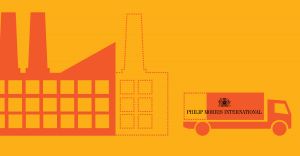EU – Baltic States, Good for Business, Investments, Lithuania, Markets and Companies
International Internet Magazine. Baltic States news & analytics
Friday, 19.04.2024, 23:55
New Philip Morris expansion in Klaipeda will increase production by 40%
 Print version
Print version |
|---|
It will include expanding the current premises and installing new high-speed production equipment.
Alberto Bernardi, director general of UAB Philip Morris Baltic, said that this is the largest expansion of the Klaipeda plant since 2004. It is also one of Philip Morris International (PMI)’s largest investments in Lithuania Alberto Bernardi since 1997, when the current Klaipeda plant – which was the first so-called “greenfield” project in Lithuania – was built.
Last year, Philip Morris closed its manufacturing facility in the Netherlands. The new investment in the Klaipeda plant will allow production to be increased by an estimated 40%, allowing the plant to take on some of the production capacity from the facility in the Netherlands.
According to Mr Bernardi, all of the additional output will be exported, mainly to Japan, which has particularly high quality requirements. PMI products for the Japanese market were previously supplied from the Dutch plant. Of the products currently manufactured in Klaipeda, 90% are exported to over 60 countries and only about 10% are sold on the local market.
Mr Bernardi said that as part of the investment project the company are building two extensions, bringing the final area of the plant in Klaipeda to 1,200 square metres.
“This year we plan to install high-speed cigarette making machines and to build additional production lines. The filter production capacity will also be increased by installing new cigarette filter making machinery. We also plan to expand the finished production transportation system”, he said.
The director general also pointed out that the new investment will lead to more orders for Lithuanian service providers. “Additional orders for local businesses are mainly related to the development of engineering systems, the installation of additional equipment, and construction work. Transportation companies will also benefit from more orders, as 52 trucks alone will be required to bring the equipment. Additional logistics services will be required for the transportation of finished products and raw materials.”
The enlarged facility will create around 40 new jobs for machine operators, technicians and electronics specialists.
For Mr Bernardi, the Klaipeda facility’s main competitive advantages are its flexibility, productivity and reliability, and it is these qualities which led PMI to invest further in the plant. “Compared to other PMI Group facilities, the Klaipeda plant’s indicators are very high, particularly in the areas of quality, environmental impact and occupational safety. Last year, we reached a new record – 4 million accident-free working hours in the workplace. In addition, we improved business processes and reduced the facility’s environmental impact. According to these indicators, we are the leading PMI factory in the European Union,” he said. He also noted that a favourable business environment and effective dialogue with the authorities were important in the decision to invest further in Lithuania.
Philip Morris has been operating in Lithuania for 20 years, and the company was the first international investor in the country after independence. Since 1994, PMI has invested more than EUR 200 million in Lithuania, a fact which Mr Bernardi believes highlights Lithuania’s qualities as an investment location. “This clearly demonstrates our confidence in the opportunities Lithuania has to offer as an excellent country in which to do business.”
Reflecting on the tobacco industry in general, Mr Bernardi noted that sales levelled off in 2014 thanks to a decrease in the illegal trade of tobacco products.
“Currently, the trade of illegal cigarettes in Lithuania is at its lowest level since 2010, when it constituted more than 40% of the market”, the director general added.
However, the illegal cigarette trade is still higher in the Baltic States than anywhere else in the EU.
According to Mr Bernardi, this is due to geographical factors: “In total, the Baltic countries have the longest external EU border on the east, and therefore have became one of the main gateways for the transportation of illegal cigarettes to EU countries. In 2013, illegal tobacco products made up similar proportions of the Lithuanian and Latvian markets (28%), while Estonia saw a reduction in the level of smuggling, with illegal products constituting less than 19% of the market.”








 «The Baltic Course» Is Sold and Stays in Business!
«The Baltic Course» Is Sold and Stays in Business!

